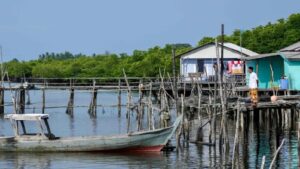An Island Fights Against Investors
The government, along with Chinese investors, plans to construct an industrial park on the Indonesian island of Rempang. As a result, approximately 7,500 people face relocation and the potential loss of their homes.
For the villagers, who technically shouldn’t even exist, these women are remarkably defiant and outspoken: “Regardless of what happens, whether the government offers us money or riches, we refuse to leave because this land belonged to our ancestors.”
Ramna, Wati, Miskia, Linda, and Dea are furious. These women stand at a protest site on Rempang, a dusty dirt road full of potholes leading to their village of Pasir Panjang. There is not much to see here: plenty of greenery, some small gardens and plantations, and the sea behind the hill a few curves away. However, according to the Indonesian government, a large industrial park is planned for the small island.
“But we only found out by chance,” says Iskandar, one of the men at the protest site. “The government did not explain what this project is, what it means for us and the environment. So, we refuse.”
Quality quartz sand and proximity to Singapore
The project is called Rempang Eco-City, primarily a glass factory to be jointly built by an Indonesian company, the local development authority, and Xinyi Glass from China. Xinyi specializes in the production of glass and solar panels.
Rempang and its surroundings have an abundance of high-quality quartz sands, essential for glass production. Additionally, its proximity to Singapore, a major trade hub located about 100 kilometers northwest, makes Rempang an attractive location for such a venture. If only there weren’t people in the way.
According to the investor, the island is uninhabited
“At first, the government acted as if the island was uninhabited,” explains protestor Rio. Even Tomy Winata, the Indonesian investor, claimed that nobody lives on Rempang. Allegedly, until the beginning of the 21st century when the first plans for economic development emerged, no one lived on Rempang.
“I have lived here even before Indonesia existed as an independent country- the government is lying!” says Grandma Cuh. She also lives in Pasir Panjang, near the seaside. She has given birth to eight children, four of whom are buried here. Her husband passed away in 1972 and is also buried here. Her mother, who lived here and lived to over 100 years old, has passed away as well. Additionally, she has 30 grandchildren and 29 great-grandchildren living on Rempang.
Although burdened by age and nearly blind, Grandma Cuh has a clear vision: “All my family members are buried here, and they all grew old here. Whatever happens, I don’t want to leave.”
The small village lies right by the water, with coconuts falling on the beach. Many residents live in houses on stilts directly above the sea. The air carries the scent of salt, warmth, fish, and forest. “This used to be a jungle, we cleared it, cut down trees, and then caught fish, crabs, and mussels,” says Cuh. “This land is our life, the sea is here, we can catch fish, our family is together here, it’s so important to me – I’m not leaving.”
China Invests Heavily in Indonesia
In July, Indonesian President Joko Widodo traveled to China and returned with significant investment promises, including for the Rempang Eco-City project.
China is the largest investor in Indonesia. Whether it’s high-speed rail lines, dams, or gold smelters, the country is a preferred partner, especially when it comes to natural resources or infrastructure. It is crucial for President Jokowi, as he is commonly known, that China also participates in the construction of the new capital on Borneo, another billion-dollar project.
Protests against Chinese projects are unwelcome to the Indonesian government, but neither Grandma Cuh nor the other women of Pasir Panjang are willing to back down. “We are ready for anything, we will continue to demonstrate, we will take to the streets and block everyone, even if they come with tractors and tanks. We are ready to die to protect our land.”
Malay Culture on Rempang Island is at Risk
Riska, one of Grandma Cuh’s grandchildren, also refuses to leave. “This is the land of my ancestors,” she says. “If we have to leave, the Malay culture will also be lost here.” And that culture is rich with its own customs and beliefs. “We want to ensure that the Malays don’t simply disappear.”
Malays are members of an ethnic group living in Malaysia and on the Indonesian islands of Sumatra and Borneo, as well as many smaller islands. Originally, Malays were a seafaring trading people, which is why they settled along the coasts. Most are Muslims, but sometimes with their own unique practices and customs, just like on Rempang.
Graves as Witnesses of the Past
Effendi, Riska’s father, kneels in front of a massive strangler fig tree in a grove by the sea. Parts of the tree are adorned with yellow cloths, he lights incense and offers some cigarettes to the ancestors, placing them in the tree’s roots.
He points to a small tombstone, also adorned with a yellow cloth, with the outline of a number visible beneath: “1825” it allegedly says. The evidence that Malays have always lived here. Many graves can be found in this grove, with another sacred tree behind them, and the sea.
Tear Gas against Demonstrators
Riska recounts how on September 7th, when government representatives approached and blocked the bridge connecting Rempang to the neighboring island, they built a barricade to protect themselves. “The police used tear gas, even against children, and shot some of us in the head with rubber bullets.”
43 people were arrested, and many are still in prison. However, the residents of Rempang remain undeterred and announce further protests.
70 Percent Oppose Relocation
Rio is also one of the demonstrators. He is organizing a kind of census, together with the environmental organization Walhi. They count the residents of the villages as evidence of their existence, gather their voices, and determine whether they are for or against relocation. “The original local residents are 70 percent against relocation. But the government keeps telling the media that 70 percent have already agreed.”
More and more people are learning about Rempang’s story and supporting the fight. As Grandma Cuh says, “I love this land – what if your land was simply taken away?”






























































